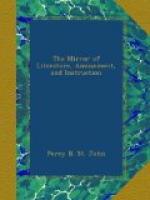of dogmas about utility, &c.; and man being a developing
animal, till he decides that “there is no
such thing as Nature; Nature is Art, or Art is Nature;
that which is most useful is most natural, because
utility is the test of Nature; therefore, a steam-engine
is in fact a much more natural production than a mountain.”
Here, observing a smile upon his majesty’s countenance,
Popanilla tells the king that he is only a chief magistrate,
and he has no more right to laugh at him than a constable.
This is “too bad” for the royal mind; Popanilla
is cut; rather crest-fallen, he sneaks home, and consoles
himself for having nobody to speak to, by reading
some very amusing “Conversations on Political
Economy.” But he sinks to rise again.
He obtains many pupils, who had no sooner mastered
the first principles of science, than they began to
throw off their retired habits and uncommunicative
manners. “Being not utterly ignorant of
some of the rudiments of knowledge, and consequently
having completed their education, it was now their
duty, as members of society, to instruct and not to
study; and on all occasions they seized opportunities
of assisting the spread of knowledge. The voices
of boys lecturing upon every lecturable topic, resounded
in every part of the island. Their tones were
so shrill, their manners so presuming, their knowledge
so crude, and their general demeanour so completely
unamiable, that it was impossible to hear them without
the greatest, delight, advantage, and admiration.”
The king at last becomes impregnated with the liberal
spirit of the age; Popanilla is “sent for”
to court; he is overpowered with promotion, told that
“with the aid of a treatise or two,” he
will make “a consummate naval commander,”
although he has “never been at sea in the whole
course of his life,” and at length thrust into
a canoe, with some fresh water, bread, fruit, dried
fish, and a basket of alligator pears. “Unhappy
Popanilla! and all from that unlucky lock of hair!”
His fright is ludicrously sketched. “Poor
fellow! how could he know better? He certainly
had enjoyed a seat at the Admiralty Board of Fantaisie,
but then he was a lay-lord.” Among his
discoveries, on the second day, at 25 m. past 3 p.m.,
though at a considerable distance, he saw a mountain
and an island: he called the first Alligator
Mountain, in gratitude to the pears; and christened
the second after his mistress; but the happy discoverer
further found the mountain to be a mist, and the island
a sea-weed. At length, on the third day, after
being in a valley formed by two waves, each 3,000 feet
high, and in as tremendous a tempest as ever raged
in Chelsea or Battersea-reach, “great, square
and solid, black clouds drew off like curtains, and
revealed to him a magnificent city rising out of the
sea. Tower and dome, arch, and column, and spire,
and obelisk, and lofty terraces, and many-windowed
palaces, rose in all directions from a mass of building,
which appeared each instant to grow more huge, till




